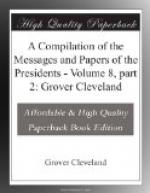Taking the nation in the aggregate, and we find its population and ratio of increase for the several decennial periods to be as follows:
Year.
Population. Ratio of increase.
Per
cent.
1790 3,929,827 .....
1800 5,305,937 35.02
1810 7,239,814 36.45
1820 9,638,131 33.13
1830 12,866,020 33.49
1840 17,069,453 32.67
1850 23,191,876 35.87
1860 31,443,790 35.58
This shows an average decennial increase of 34.60 per cent in population through the seventy years from our first to our last census yet taken. It is seen that the ratio of increase at no one of these seven periods is either 2 per cent below or 2 per cent above the average, thus showing how inflexible, and consequently how reliable, the law of increase in our case is. Assuming that it will continue, it gives the following results:
Year. Population.
1870 42,323,341 1880 56,967,216 1890 76,677,872 1900 103,208,415 1910 138,918,526 1920 186,984,335 1930 251,680,914
These figures show that our country may be as populous as Europe now is at some point between 1920 and 1930—say about 1925—our territory, at 73-1/3 persons to the square mile, being of capacity to contain 217,186,000.
And we will reach this, too, if we do not ourselves relinquish the chance by the folly and evils of disunion or by long and exhausting war springing from the only great element of national discord among us. While it can not be foreseen exactly how much one huge example of secession, breeding lesser ones indefinitely, would retard population, civilization, and prosperity, no one can doubt that the extent of it would be very great and injurious.
The proposed emancipation would shorten the war, perpetuate peace, insure this increase of population, and proportionately the wealth of the country. With these we should pay all the emancipation would cost, together with our other debt, easier than we should pay our other debt without it. If we had allowed our old national debt to run at 6 per cent per annum, simple interest, from the end of our revolutionary struggle until to-day, without paying anything on either principal or interest, each man of us would owe less upon that debt now than each man owed upon it then; and this because our increase of men through the whole period has been greater than 6 per cent—has run faster than the interest upon the debt. Thus time alone relieves a debtor nation, so long as its population increases faster than unpaid interest accumulates on its debt.




